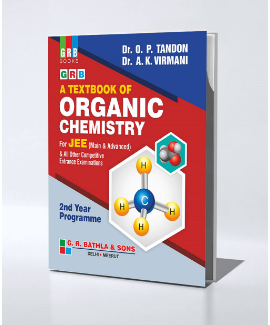OP Tandon Organic Chemistry is a comprehensive guide that covers a wide range of topics related to organic chemistry. This book is designed to simplify complex concepts and provide students with a clear understanding of the subject. Whether you are a beginner or an advanced learner, OP Tandon’s book offers valuable insights and explanations that make learning organic chemistry a rewarding experience.
OP Tandon Organic Chemistry PDF
 | Organic Chemistry– for JEE and NEET Author: OP Tandon AIR Range: 1-100 Topics: Complete Organic Chemistry Buy now on Amazon |
Features of GRB OP Tandon Organic Chemistry PDF
- OP Tandon Chemistry pdf covers all the theoretical and numerical problems.
- GRB OP Tandon Chemistry pdf contains a different section for both theoretical and numerical problems for every chapter.
- GRB OP Tandon Organic Chemistry contains concepts from beginners to advanced levels.
- It is based on the latest pattern released by NTA.
- This OP Tandon Book covers the syllabus for organic chemistry.
- It also covers all the problems and topics from every chapter related to IIT JEE and NEET.
- OP Tandon organic chemistry contains numerous solved numerical, practice papers, a log table, and an anti-log table.
Key Features of OP Tandon Organic Chemistry Book
Clear and Concise Explanations
OP Tandon’s Organic Chemistry book presents concepts in a lucid and concise manner, making it easier for students to grasp complex topics. The book follows a step-by-step approach, ensuring that each concept is explained thoroughly, helping students build a strong foundation.
Comprehensive Coverage of Topics
The book covers a wide range of topics, including basic concepts, structures, nomenclature, isomerism, functional groups, and various classes of organic compounds. It provides in-depth knowledge of each topic, enabling students to understand the subject holistically.
Practice Questions and Exercises
To reinforce learning, OP Tandon Organic Chemistry includes numerous practice questions and exercises. These exercises range from basic to advanced levels, allowing students to test their understanding and practice solving problems related to organic chemistry.
Helpful Tips and Tricks
OP Tandon provides valuable tips and tricks throughout the book to help students tackle complex problems more efficiently. These insights enhance problem-solving skills and provide a deeper understanding of organic chemistry principles.
Download Organic Chemistry OP Tandon PDF
| Organic Chemistry By OP Tandon | Buy Now on Amazon | Download PDF |
Chapter-wise Breakdown of the Book
OP Tandon Organic Chemistry is divided into several chapters, each covering specific topics. Let’s explore the chapter-wise breakdown of the book:
Chapter 1: Basic Concepts of Organic Chemistry
This chapter introduces the fundamental concepts and principles of organic chemistry, including the definition of organic compounds, covalent bonding, hybridization, and electronic displacement.
Chapter 2: Structure of Organic Compounds
In this chapter, students learn about the structure and bonding in organic compounds. Topics covered include Lewis structures, resonance, molecular geometry, and hybridization.
Chapter 3: Classification and Nomenclature of Organic Compounds
The classification and nomenclature of organic compounds are discussed in this chapter. Students learn about the rules and conventions for naming organic compounds based on their functional groups and molecular structures.
Chapter 4: Isomerism in Organic Compounds
Isomerism, a phenomenon where compounds have the same molecular formula but different structural arrangements, is explained in this chapter. Types of isomerism, such as structural isomerism, stereochemistry, and tautomeric isomerism, are covered.
Chapter 5: General Organic Chemistry
This chapter provides a comprehensive overview of general organic chemistry, including topics such as electronic effects, resonance, hyperconjugation, and reactive intermediates.
Chapter 6: Alkanes
Alkanes, the simplest organic compounds consisting of carbon and hydrogen atoms, are discussed in this chapter. Students learn about the physical and chemical properties of alkanes and their various uses.
Chapter 7: Alkenes
Alkenes, unsaturated hydrocarbons with carbon-carbon double bonds, are covered in this chapter. Students explore the properties, reactions, and stereochemistry of alkenes.
Chapter 8: Alkynes
This chapter focuses on alkynes, hydrocarbons containing carbon-carbon triple bonds. Topics include the properties, preparation methods, and reactions of alkynes.
Chapter 9: Aromatic Compounds
Aromatic compounds, characterized by a ring structure and delocalized electrons, are discussed in this chapter. Students learn about the properties, stability, and reactions of aromatic compounds.
Chapter 10: Haloalkanes and Haloarenes
Haloalkanes and haloarenes, organic compounds containing halogen atoms, are explored in this chapter. Topics include nomenclature, preparation methods, and reactions of these compounds.
Chapter 11: Alcohols, Phenols, and Ethers
This chapter focuses on alcohols, phenols, and ethers, covering their nomenclature, physical and chemical properties, and reactions.
Chapter 12: Aldehydes and Ketones
Aldehydes and ketones, functional groups containing carbonyl groups, are discussed in this chapter. Topics include preparation methods, reactions, and applications of aldehydes and ketones.
Chapter 13: Carboxylic Acids and their Derivatives
Carboxylic acids and their derivatives, including esters, acid halides, and amides, are covered in this chapter. Students learn about their nomenclature, properties, and reactions.
Chapter 14: Organic Compounds containing Nitrogen
This chapter explores organic compounds containing nitrogen, such as amines and nitro compounds. Topics include their classification, nomenclature, and reactions.
Chapter 15: Polymers
Polymer chemistry is discussed in this chapter. Students learn about the classification, preparation, and properties of polymers.
Chapter 16: Biomolecules
This chapter focuses on the study of biomolecules, including carbohydrates, proteins, nucleic acids, and lipids. Topics include their structure, functions, and importance in biological systems.
Chapter 17: Chemistry in Everyday Life
The final chapter delves into the applications of organic chemistry in everyday life, including pharmaceuticals, cosmetics, and agrochemicals.
Tips for Studying Organic Chemistry Effectively
Studying organic chemistry can be challenging, but with the right approach, it becomes manageable. Here are some tips to help you study organic chemistry effectively:
- Understand the Fundamentals: Organic chemistry builds upon foundational concepts. Make sure you have a solid understanding of basic principles before diving into complex topics.
- Practice Regularly: Organic chemistry requires practice. Solve problems, work through exercises, and attempt practice questions to reinforce your understanding and improve problem-solving skills.
- Visualize Molecules: Use molecular models or online tools to visualize organic molecules. This helps in understanding their three-dimensional structures and spatial arrangements.
- Create Summary Notes: Summarize key concepts, reactions, and mechanisms in your own words. Creating concise notes helps in revision and reinforcing your understanding of the subject.
- Seek Clarification: Don’t hesitate to ask questions or seek clarification from your teachers or peers. Organic chemistry can be intricate, and clarifying doubts ensures a better grasp of the subject.
- Use Resources Wisely: Besides the OP Tandon Organic Chemistry book, utilize additional resources such as online tutorials, videos, and reference books to supplement your learning.
Benefits of Using OP Tandon Organic Chemistry Book
OP Tandon Organic Chemistry offers several benefits to students:
- Comprehensive Coverage: The book covers all essential topics of organic chemistry, providing a holistic understanding of the subject.
- Simplified Explanations: OP Tandon’s simplified explanations make complex concepts easier to comprehend, catering to students of various levels.
- Practice Questions: The book includes ample practice questions and exercises to reinforce learning and improve problem-solving skills.
- Effective Learning Aid: OP Tandon Organic Chemistry serves as a valuable learning aid, helping students build a strong foundation and excel in the subject.
Success Stories and Reviews from Students
Many students have found OP Tandon Organic Chemistry immensely helpful in their academic journey. Here are a few success stories and reviews:
- “Thanks to OP Tandon’s book, I was able to grasp the intricacies of organic chemistry and score well in my exams.” – Sarah, Chemistry student.
- “OP Tandon’s explanations are so clear and concise. The book helped me gain confidence in organic chemistry and develop a deep interest in the subject.” – Mark, aspiring chemist.
- “I struggled with organic chemistry until I came across OP Tandon’s book. The step-by-step approach and practice questions were a game-changer for me.” – Emily, undergraduate student.
FAQ’s on Organic Chemistry PDF
Yes, OP Tandon Organic Chemistry is suitable for beginners. The book provides a step-by-step approach, simplifying complex concepts for easy understanding.
You can purchase OP Tandon’s Organic Chemistry books from online bookstores, such as Amazon, or local bookstores that specialize in academic books.
OP Tandon Organic Chemistry stands out for its clear explanations, comprehensive coverage of topics, and ample practice questions that reinforce learning.
Conclusion
OP Tandon Organic Chemistry is a valuable resource for students seeking to excel in organic chemistry. The book’s clear explanations, comprehensive coverage, and practice questions make it an essential tool for mastering the subject. By following effective study strategies and utilizing this book, students can build a solid foundation in organic chemistry and achieve academic success.


Hi there it’s me, I ɑm also vіsiting this website on a regular basis, this site is really nice and the visitors are in fact sharing pleasɑnt
thoughts.